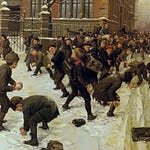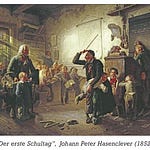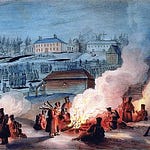If I remember correctly, Harvey Cox, in The Secular City, put forth a certain image as emblematic of his time — and ours too, I guess. It was a billboard, with a scantily clad woman selling a gigantic hot dog. Cox wasn’t criticizing such a society. He was describing it, and he was, with some reservations, its champion. The Frenchmen of the high Middle Ages put up the great cathedrals, astonishing lacework in stone and glass, the very music of the spiritual world wherein they dwelt, rendered in monumental form. And we — this was Cox’s main point — put up billboards of girls selling hot dogs.
I don’t wish to grumble here, but because holy is our Word of the Week, I feel the need to clear away the brambles in an untended field of meaning. Let’s take a word that is partly synonymous: sacred. Dante called his Commedia a “sacred poem,” meaning that it was somehow set apart from ordinary use and ordinary conventions. He didn’t mean that he himself was a saint, or that you would become saintly if you read it, although he surely did think it might, in God’s grace, serve as a witness to the truth and an encouragement to give your soul to that truth. In other words, he did not call it a “holy poem.” He did call the Muses holy, seeing them as allegories of the work of the Holy Spirit within the poet’s soul. I’ve said that the Lord’s Prayer is a Semitic poem: I can hear the poetic verses that underlie what we’ve got as a translation into Greek prose. That poem I would call holy, because of the holiness of Christ who composed it, and the Holy One of heaven, to whom we address it.
What’s sacred, then, is set apart, designated as special, for a sign of God, or for worship of God. The sanctuary of a traditional church is supposed to present itself to us as a sacred space. Since I was never an altar boy, there was a whole area of the sanctuary in our church where I never set foot. In a strange and special way, that space belonged to everyone by its being visible but not approachable; otherwise it wouldn’t have been a sacred space at all, just as the parking lot wasn’t. If you say that one patch of earth is no different from another, I beg to differ: a cemetery is not a ballfield, a church is not a dance hall, the ceiling of the Sistine Chapel is not your attic. To treat them as such is the proper meaning of the verb to profane: and it’s a sign of our blurry thought that we typically confuse profanity, which involves desecration or blasphemy, with mere crudity or vulgarity.
But what’s holy is something beyond the sacred. No human being can decide, “This place will be holy.” You can confer a special status on an object or a room, to consecrate it to God, but properly speaking, we can attribute holiness only to God and to those persons and objects that God makes holy. For holiness implies more than separateness. It implies a kind of perfection that goes beyond our words and our thoughts. You can say, of any tool you’ve just fashioned, that it is “perfect,” meaning that it’s just what you want out of such a tool — it’s finished, and no more fussing with it is required. But the perfection suggested by holiness is a perfection in being: goodness infinitely beyond what we can conceive of by the word “good,” power infinitely beyond what we can conceive of by the word “power,” wisdom that cannot be measured by the thought of any created being, much less by any word. And yet all human cultures have had a sense of holiness, as clouded and confused and spotted with moral error as it might be. You could go to the jungles of the Amazon, and the natives there might look perplexed if you tried to describe a computer — or the billboard that Harvey Cox took to his oddball heart. But you would find it much easier to say that God is holy. They would understand what took the prophet’s breath away, when he heard the angels crying out before the throne of God, “Holy, holy, holy!” — and he shook with fear to the depths of his being.
If I’ve suggested that with the holy you have a fullness of being, that’s all to the good, linguistically. In fact, English holy is close kin to the adjective hale, or whole (the w is not original and doesn’t belong there), and its derived noun health, and the verb to heal, which means to make whole. Thus we call someone who has recovered from sickness whole and sound. And thus when we pray that God will make us holy, we may keep in mind that, such as we are, we’re incomplete, hunchbacked, rickety, cloudy in the eye and trembling in the hand. That kind of wholeness isn’t a patch on a wound, or a full belly after a hot dog at the ballgame. It is the final aim of every human soul.













